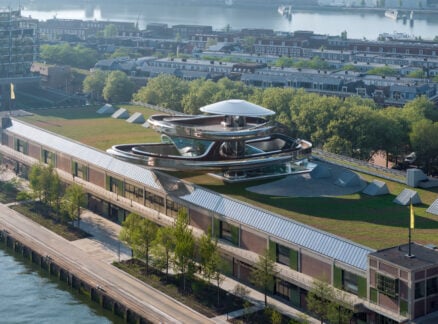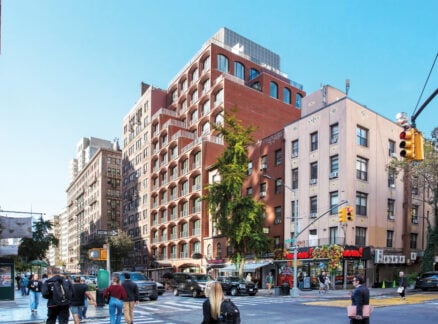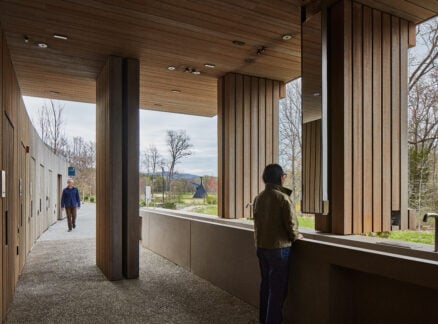
September 28, 2018
New Renzo Piano–Designed Building Opens at Columbia University
Dubbed “The Forum,” the 56,000-square-foot project on the university’s 17-acre Manhattanville campus aims to be a global and local hub for lectures, conferences, and events.

At Wednesday’s opening of The Forum, Italian architect Renzo Piano was himself—avuncular, poetic, and passionate. Speaking in the building’s 437-seat auditorium, Piano described the glass-and-steel edifice as a meeting place for local Harlem residents, university staff and students, and scholars from the world over. This building, he affirmed, is nothing less than “a factory of ideas.” The Forum is indeed ambitious project, one that aims to simultaneously become a world-renowned academic center while assuaging concerns that the university is an unwelcome intruder in Harlem.
The Manhattanville campus, which includes urban design by Renzo Piano Building Workshop (RPBW) and Skidmore, Owings & Merrill (SOM), has faced opposition from some in the Harlem community. The plan’s controversy included a 2009 court ruling—eventually overturned—that found New York state’s eminent domain seizure of the site disproportionately benefited the university, especially in light of the university’s contributions to the site’s blight conditions. The campus’ construction proceeded and the Forum is just its latest completed project: Already-built are the Jerome L. Green Science Center, Lenfest Center for the Arts, and a small plaza, with several other public spaces and buildings (both ground-up and adaptive re-use) on the way. However, the Forum is a centerpiece in the university’s efforts to become a beneficial force in Harlem.

Presenters at the Forum’s opening ceremony emphasized the Manhattanville plan’s overall openness (there are no gates or walls), transparency (especially vis-a-vis the campus buildings’ glazed first floors), and tree-lined public plazas and sidewalks. However, the Forum occupies the campus’ most prominent site: located on 125th St. and Broadway, it will be the first building those entering from the subway or bustling 125th St. will see. The Forum will also extensively interact with the public: its ground floor will be publicly accessible and include a flexibly-programmed lobby, a café, and free Wifi. A university communications official said various spaces—such as the ground-floor lobby and main auditorium—can be reserved by local community members for their use, though the university hasn’t yet finalized the process for making those arrangements. Still, those speaking at the opening were optimistic that it could become a true public amenity: Manhattan Borough President Gale Brewer lauded the Forum, saying Renzo Piano “understands how to bring the community in.”
Aesthetically, the lower floors’ glass windows showcase RPBW’s signature custom steel mullions and detailing. On its upper two floors, the Forum’s orange-carpeted offices will host two Columbia University programs: Columbia World Projects (which aims to connect university departments with global agencies fighting a broad range of social and environmental issues) and the Obama Foundation Scholars (which seeks to foster new political leadership). Those offices are glazed while precast concrete panels clad the main auditorium.

While the auditorium’s prowlike figure is hard to miss, Piano emphasized the transparency of the Forum and its neighbors. Their all-glass offices and labs are about making visible the campus’ mix of “science, society, art.” In putting all that activity on display, the architect hopes to create a stimulating environment for all its users.
Still, when it comes to the community, the university’s work has just begun: Speaking at the opening, the Forum’s director Mary McGee said that, “now we need to build the partnerships, the programming” that will “[break] down the town-and-gown divides.”
You may also enjoy “Can London’s Revamped Royal Opera House Become a Public Amenity?“
















